Pros by any other name? Sport stars and extreme advertising
After tennis star Maria Sharapova considered changing her name during the US Open to promote her own brand of sweet, Channel 4 News examines other extraordinary sporting name changes.

(Graphic: Ciaran Hughes)
Sharapova was reported to be planning the name change in time for the US Open, which begins on Monday, in a bid to boost the “gummies” company she launched a year ago.
It was also said that Sharapova, who would revert back to her original name at the end of the tournament, is hoping to wear the logo of her company, a pair of red lips, on court.
But her agent said after giving the name change idea serious consideration, she had decided against it.
Sport stars have a rich history of changing their names, for a variety of reasons. Muhammad Ali is perhaps the most famous example, changing from slave name Cassius Clay after he joined the Nation of Islam religious movement.
In September 2011, US basketball professional Ron Artest changed his name to Metta World Peace (Metta being a Buddhist world for loving-kindliness).
But what are the other extreme name changes sportstars have committed to, and to have done so for money?
White pockets brown
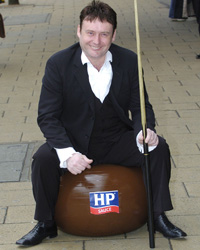
Snooker veteran, Jimmy ‘Whirlwind’ White, agreed to change his name by deed poll to James Brown in order to secure a snooker sponsorship deal in 2005 with company, HP, famous for their brown sauce.
The much needed sponsorship deal came after snooker began to struggle as a result of the government’s ban on tobacco advertising across sports the previous year.
When he was first approached about the name change Jimmy thought it was “a wind-up” but went ahead with it because snooker needed the financial boost.
Since turning professional in 1980 Jimmy has won 23 professional titles and is six-time world championship finalist.
Fantasy Farnborough
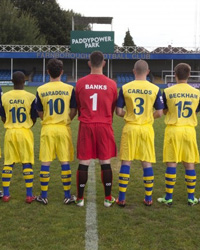
Earlier this month every player of Farnborough football club’s first team squad changed their name by deed poll to that of the biggest football legends of all time.
The non-league side hoped that the significant six-figure sponsorship deal with bookmakers Paddy Power would change their fortunes.
Team players include the likes of Beckham, Maradona, Messi and Lineker in a star-filled fantasy team most football fans could only dream of.
Even manager, Spencer Day, had his name transformed to become Jose Mourinho as part of the deal which was also intended to be a bit of light-hearted fun.
Purr-fect fit
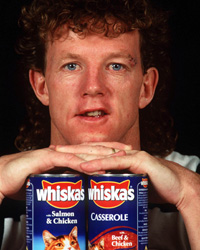
In 1998, Garry Hocking, then captain of an Australian rules team, changed his name on deed poll to “Whiskas” after the cat food brand.
The deal, thought to be worth between £100,000 and £200,000, came as purr-fect news to the club Geelong Cats which was in need of the money.
Despite sharing his name with the cat food brand, Garry said at the time that it was a light-hearted change which would help get the club out of financial difficulty.
Some of the money was also donated to Geelong Animal Welfare Centre by the club.
Rugby brew-nion
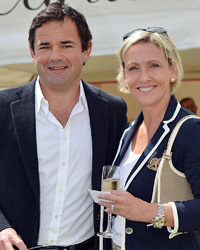
The ex-wife of former rugby union player Will Carling temporarily changed her name to Heineken in 1998 in order to raise money for charity.
Julia Carling became Heineken on deed poll as part of a sponsorship deal which lasted the duration of the Rugby Union World Cup with sponsors Heineken.
By losing the surname shared with the rival lager company, the TV presenter donated her share of the fund to breast cancer charity Breakthrough.
Julia was unable to use her temporary name while doing her presenting job on music TV channel VH1 so she was known as Julia H to avoid breaking advertising regulations.
Banani Hammock
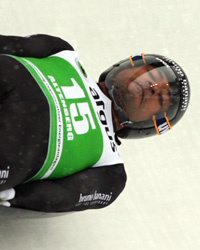
In 2012 a reported Tongan luger and 2014 Winter Olympics hopeful was revealed to be a marketing hoax to secure sponsorship from a German underwear firm.
Bruno Banani, sporting the catchphrase “coconut powered”, was said to be the son of a coconut farmer from the South Pacific nation striving to achieve the Tongan Princess Royal, Salote Mafile’o Pilolevu Tuita’s ambition of seeing one of her citizens gain a victory in the sport.
It was later revealed that the luger was in fact IT student, Fuahea Semi, chosen to be part of the marketing stunt and was not the son of a coconut farmer.
However the marketing ploy did secure considerable media attention alongside a sponsorship deal with an underwear company called Bruno Banani in the east German city of Chemnitz.
Name, set and match
Channel 4 News asked our Twitter followers for their suggestions on tennis stars who could change their names to advertise confectionery.
See our suggestions, and our favourite responses, below:
Maria Sharapova to be change her name to Sugarpova, her sweet brand, for US Open. Who next? Andy Murray Mint? David Ferrer-o Roche? #c4news
— Channel 4 News (@Channel4News) August 20, 2013
@Channel4News Boris Double-Becker?
— Rich (@RichBigCheese) August 20, 2013
@Channel4News James Flake? Marion Mars-Bartoli?
— Gregg (@GreggCMorgan) August 20, 2013
@Channel4News rafa cakes?
— rich Jones (@rjonjonesy) August 20, 2013
-
Latest news
-
Tim Booth of the band James’ on agism in music, topping the charts and AI6m

-
As India goes to the polls in the world’s largest election – what do British-Indians think?6m

-
Tees Valley: Meet the candidates in one of the biggest contests coming up in May’s local elections4m

-
Keir Starmer says public sector reform will be a struggle7m

-
Nicola Sturgeon’s husband Peter Murrell charged with embezzlement of funds from SNP1m

-




